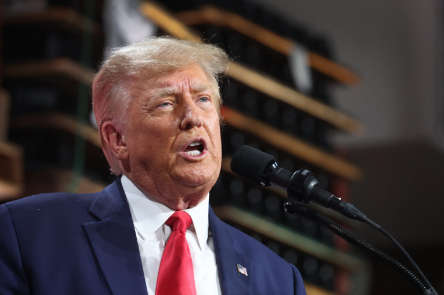
In an unanimous decision Monday, March 4, the U.S. Supreme Court overturned a Colorado Supreme Court’s 4-3 ruling that Donald Trump could not appear on the presidential primary ballot in the state. He is now able to run for the presidency in every state, in spite of the provision from the 14th Amendment, Section 3, that restricts those who have taken an oath of office and then incite an insurrection from running for office again.
In its ruling, the Court surprisingly remained silent on the issue of whether Trump engaged in an “insurrection.” Instead, the decision was a technical one—the Court decided that states are able to enforce Section 3, but only for those running for state offices. In this case, Colorado enforced the section against Trump while he was running for a federal office, not a state office.
Five justices from the conservative wing of the court—Roberts, Thomas, Alito, Gorsuch, and Kavanaugh—further opined that only Congress has the power to enforce Section 3 against candidates for federal office, citing Section 5 of the same amendment, which states that Congress is able to pass “appropriate legislation” to enforce the amendment. The remaining four justices did not agree, with Sotomayor, Kagan, and Jackson stating “[i]f it is not necessary to decide more to dispose of a case, then it is necessary not to decide more,” citing Justice Robert’s opinion from Dobbs v. Jackson Women’s Health Organization, the 2022 ruling that overturned Roe v. Wade. The three justices argued that only giving Congress the ability to disqualify federal candidates “shuts the door on other potential means of federal enforcement.”
The decision’s timing on the day before Super Tuesday showcased the significance of the decision for the 2024 presidential election. It affirmed Trump’s right to run for office the day before Colorado and 15 other states, as well as one territory, held their primaries and caucuses for the election. This was also the first time the Court weighed in on a presidential election since 2000, when the court ended a vote recount in Florida—and the fate of the entire election—in Bush v. Gore.
In the wake of the decision, Conservatives labeled the ruling as a win for democracy and for Trump’s campaign, especially as a Biden–Trump rematch seems likely after Nikki Haley’s suspension of her campaign. “I was very honored by a nine-to-nothing vote,” Trump commented about the ruling in a conservative podcast. “And this is for future presidents; this is not for me.”
Conversely, critics decried the decision as a blow to the principles of accountability and integrity in the government, arguing that it set a dangerous precedent by seemingly absolving individuals of consequences for their actions and only allowing Congress to make similar decisions in the future.
Due to the Court’s decision that Congress holds the power to pass laws to disqualify candidates, some analysts have commented that the Democrats could use the certification of the 2024 election on January 4, 2025, as a time to disqualify Trump from the office should he eventually win the election. The certification of the vote was previously seen as just a formality until 2021, when Trump encouraged his followers to engage in a breach of the Capitol that has since been labeled as an insurrection, and had caused the debates on the extent of Section 3’s provisions and Trump’s qualification for office in the first place. An effort to disqualify Trump at the vote certification would be even more likely if Trump is convicted on any of the criminal charges pending against him, especially because many of these trials are now delayed to around the time of the elections in November.












